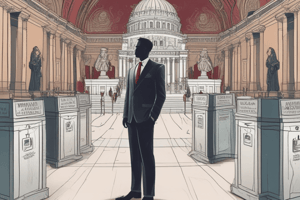Podcast
Questions and Answers
Which of the following best describes electoral politics?
Which of the following best describes electoral politics?
- The process of selecting leaders through appointments rather than elections
- A method where leaders are chosen by birthright
- A system where only a select few citizens are allowed to vote
- A process where citizens participate in choosing leaders and policies through regular elections (correct)
What is the purpose of voting rights in electoral politics?
What is the purpose of voting rights in electoral politics?
- To make it difficult for citizens to exercise their right to vote
- To ensure that eligible citizens have the right to vote without barriers like discrimination or voter suppression (correct)
- To exclude certain groups from participating in elections
- To limit the number of eligible voters to ensure control
How do election systems differ in selecting leaders and policies?
How do election systems differ in selecting leaders and policies?
- By favoring a single political party in all elections
- By allowing leaders to be self-appointed without citizen involvement
- By preventing all political parties from participating in the process
- By using mechanisms and rules that vary from winner-takes-all to more proportional representation systems (correct)
Which electoral system combines different elements to ensure fair results?
Which electoral system combines different elements to ensure fair results?
What role do voting rights play in promoting democracy?
What role do voting rights play in promoting democracy?
How can election systems influence the representativeness of governments?
How can election systems influence the representativeness of governments?
What is the primary purpose of political campaigns?
What is the primary purpose of political campaigns?
Why are elections considered a cornerstone of democratic society?
Why are elections considered a cornerstone of democratic society?
What is voter suppression?
What is voter suppression?
How can electoral fraud undermine the integrity of elections?
How can electoral fraud undermine the integrity of elections?
What is a key challenge associated with campaign finance laws?
What is a key challenge associated with campaign finance laws?
How does foreign interference impact elections?
How does foreign interference impact elections?
Flashcards are hidden until you start studying
Study Notes
Electoral Politics: Understanding Voting Rights, Systems, and Challenges
Electoral politics refers to the process through which citizens participate in choosing their leaders and policies via regular, organized elections. This article delves into the subtopics of voting rights, election systems, political campaigns, and the challenges to free and fair elections that are integral components of electoral politics.
Voting Rights
Voting rights are the fundamental basis of electoral politics, enshrined in constitutions and laws to ensure that all eligible citizens have the right to participate without facing barriers such as discrimination, voter suppression, or disenfranchisement. The right to vote is often expanded through the ratification of amendments or the passage of legislation, with countries like the United States, for instance, having legislated voting rights for women (19th Amendment) and citizens of color (Voting Rights Act of 1965).
Election Systems
Election systems refer to the mechanisms and rules used to select leaders and policies, from simple plurality systems (winner-takes-all) to more complex proportional systems (representing all political parties). There are also hybrid systems, such as the U.S. Electoral College, which combines different elements to ensure fair results. Election systems can influence the outcomes, with more proportional systems potentially resulting in more representative governments.
Political Campaigns
Political campaigns are organized efforts by candidates, parties, and interest groups to persuade voters and gain their support. Campaigns involve a variety of strategies and tactics, from crafting compelling messages and advertising to grassroots organizing and door-to-door canvassing. Campaigns can be costly and time-consuming, with many candidates and organizations relying on large donations, fundraising, and volunteer support to succeed.
Why Elections
Elections are a cornerstone of democratic society, providing citizens with a way to express their preferences and participate in government. Elections also help to hold leaders accountable, prevent authoritarianism, and promote social cohesion. Elections can empower citizens, as they have the ability to select their leaders and policies, and even remove them if they are not performing to expectations.
Challenges to Free and Fair Elections
Despite their importance, electoral politics is not without its challenges. Free and fair elections require a commitment to democratic principles, the rule of law, and respect for human rights. However, there are numerous challenges that can undermine the integrity of electoral processes, including:
- Voter suppression: Efforts to prevent or deter eligible citizens from voting, often through discriminatory laws or practices.
- Electoral fraud: Attempts to manipulate the electoral process through falsification, forgery, or other illegal means.
- Campaign finance laws: Weak or non-existent regulation of campaign donations, leading to corrupt practices and undue influence.
- Political interference: Attempts by powerful individuals or organizations to influence the outcome of elections, often through the manipulation of electoral processes or the dissemination of disinformation.
- Foreign interference: Attempts by foreign governments or actors to influence the outcome of elections, often through the spread of disinformation, cyber-attacks, or financial support to political candidates and parties.
Addressing these challenges is essential to ensuring the integrity of electoral processes and promoting free and fair elections.
Electoral politics is a complex and dynamic field that encompasses a wide range of issues and challenges. By understanding the subtopics of voting rights, election systems, political campaigns, and the challenges to free and fair elections, we can better appreciate the importance of electoral politics and the role that citizens play in shaping their societies.
Studying That Suits You
Use AI to generate personalized quizzes and flashcards to suit your learning preferences.




